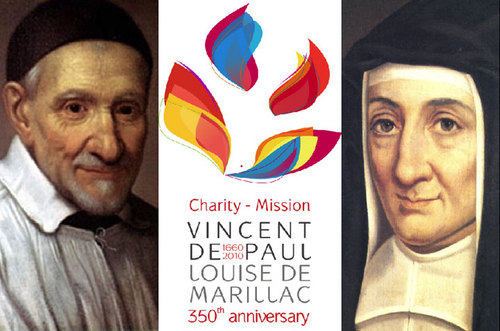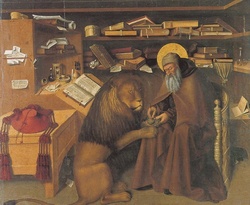 At Mass today the preacher told us of a vision Saint Jerome had of Christ who asked him: Are you going to follow Cicero or me? (Jerome was educated in Latin literature and was a "student" of Cicero.) We know the end of the story for Jerome, but what of each of us?
At Mass today the preacher told us of a vision Saint Jerome had of Christ who asked him: Are you going to follow Cicero or me? (Jerome was educated in Latin literature and was a "student" of Cicero.) We know the end of the story for Jerome, but what of each of us?Saints: September 2010 Archives
 At Mass today the preacher told us of a vision Saint Jerome had of Christ who asked him: Are you going to follow Cicero or me? (Jerome was educated in Latin literature and was a "student" of Cicero.) We know the end of the story for Jerome, but what of each of us?
At Mass today the preacher told us of a vision Saint Jerome had of Christ who asked him: Are you going to follow Cicero or me? (Jerome was educated in Latin literature and was a "student" of Cicero.) We know the end of the story for Jerome, but what of each of us?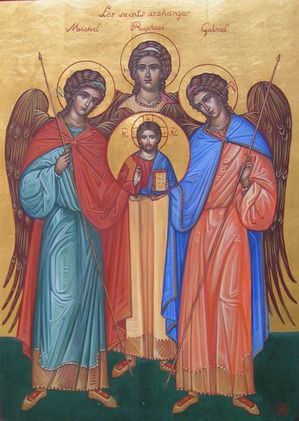 Our Catholic faith teaches us that angels have a general and yet an important part to play in our salvation history, especially personally guiding us. Moreover, the Archangels Michael, Gabriel and Raphael are given to us by God for very specific purposes and they are the only angels named in sacred Scripture.
Our Catholic faith teaches us that angels have a general and yet an important part to play in our salvation history, especially personally guiding us. Moreover, the Archangels Michael, Gabriel and Raphael are given to us by God for very specific purposes and they are the only angels named in sacred Scripture.
And so today, the Church honors the archangels, invokes their intercession and relies on their assistance in the spiritual warfare we daily face.
In Hebrew, "Michael" means "Who is like God?" Saint Michael is mentioned four times in Scripture: Daniel 10 and 12, in Jude and in Revelation. Scripture reveals to us that Saint Michael is known as the "Prince of the Heavenly Host," hence, the leader of all angels. It is to the Prince of the Heavenly that we owe a debt of gratitude for casting down to Hell Lucifer and the evil spirits; he is invoked for protection against Satan and all evil.
Sacred Tradition teaches that there are four offices connected to Saint Michael:
- to fight against Satan, his minions and the power of evil
- to rescue and protect the faithful from evil, especially at the hour of death
- to lead the people of God to full communion with God Himself
- to call our souls to judgment before God.
We know the archangel from his announcement of the dawn of salvation to Mary: "I am Gabriel, who stand before God" (Luke 1:19). What is crucial to remember about Gabriel are his two announcements in the New Testament: the birth of John the Baptist to his father Zachary and of the Incarnation, the Word made flesh in Mary. Saint Gabriel, whose name means "God's strength," is also mentioned four times in Scripture.
Again, sacred Tradition tells us that it is Saint Gabriel who appeared to Saint Joseph and to the shepherds. At the beginning of the Passion it was Gabriel who "strengthens" Jesus in the his agony of the garden.
"I am the angel Raphael, one of the seven, who stand before the Lord" (Tobit 12:15)
Saint Raphael, whose name means "God has healed" because of his healing of Tobias' blindness in the Book of Tobit. This book in the Old Testament is the only book in which Raphael is mentioned. He is the archangel of healing and acts of mercy. Tradition tells us that Saint Raphael is the angel in John 5:1-4 who descended upon the pond and bestowed healing powers upon it so that the first to enter it after it moved would be healed of whatever infirmity he was suffering.
As point of trivia, the Catholic hospital in New Haven, CT is named for Saint Raphael, likely the only one in the USA.
Those familiar with what is called the "old Mass" will remember praying the Prayer to Saint Michael at the conclusion of Mass. In 1899, after a vision of evil, Pope Leo XIII wanted to protect the Church and instructed that his prayer be prayed by all, especially the priest. I can't recommend the prayer enough to you when making your thanksgiving following Mass or the Divine Office. Plus, I would recommend that you pray the Prayer to Saint Michael prior to going to bed.
Saints Michael, Gabriel and Raphael, pray for us.
In the Pope's Weekly Sunday Angelus Address (September 26, 2010) he spoke of Saint Vincent de Paul. Sunday's gospel of the parable of the rich man and Lazarus gave Benedict XVI a perfect context by which to teach that us that "God loves the poor and raise them from their abjection; secondly, that our eternal destiny is dependent upon our behavior, it is up to us to follow the path God has shown us in order to achieve live, and this path is love, understood not as emotion but as service to others in the charity of Christ," and further the Pope said:
"By a happy coincidence, tomorrow (9/26/2010) we will celebrate the liturgical memorial of St. Vincent de Paul, patron of Catholic Charities, which marks the 350th anniversary of his death. In France of 1600, he touched with his hand the sharp contrast between the richest and poorest. In fact, as a priest he was able to attend both the aristocratic circles, campaigns, as well as the slums of Paris. Driven by the love of Christ, Vincent de Paul was able to organize stable forms of service to the marginalized people, giving rise to so-called "Charitees," the "Charity," i.e., groups of women who put their time and property available to more marginalized. Among these volunteers, some chose to devote themselves completely to God and the poor, and thus, along with St. Louis de Marillac, St. Vincent founded the "Daughters of Charity," the first female congregation to live their consecration "in the world," among all the people, the sick and needy."
Strive to live content in the midst of those things that
cause your discontent. Free your mind from all that troubles you, God will take
care of things. You will be unable to make haste in this [choice] without, so
to speak, grieving the heart of God, because he sees that you do not honor him sufficiently
with holy trust. Trust in him, I beg you, and you will have the fulfillment of
what your heart desires (St. Vincent de Paul, Letters).
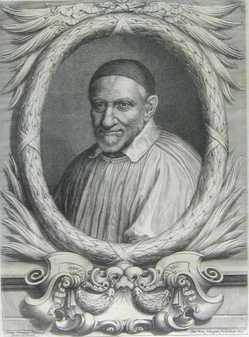 In honoring Saint Vincent de Paul today let's call to mind the myriad of ways he and his spiritual sons and daughters have served, and continue to serve, the Gospel by serving the poor and uneducated. Have you got your copy of the video "Charity's Saint: St Vincent de Paul"? I pray in thanksgiving for the Vincentian priests in New Haven who were my spiritual guides as a child.
In honoring Saint Vincent de Paul today let's call to mind the myriad of ways he and his spiritual sons and daughters have served, and continue to serve, the Gospel by serving the poor and uneducated. Have you got your copy of the video "Charity's Saint: St Vincent de Paul"? I pray in thanksgiving for the Vincentian priests in New Haven who were my spiritual guides as a child.
With glowing light sent from above,
O Vincent, how you guide our way!
Your virtues and example pure
Show us the path to heaven's day.
With self-effacing modesty,
You made yourself of little state;
Your gentleness and simple life
Made you revered by small and great.
Amidst the graces of your life
Your charity sheds brightest fire:
How many of the poor it fed,
Filled many hearts with Christ's desire.
Urged on by zeal and charity,
You preached in town and countryside,
Proclaiming all God's mysteries
To poor and rich, both far and wide.
Beneath your wings you gathered those
Who longed to share both work and strife.
By word and deed you taught them well;
You formed and taught them by your life.
To God, the holy Three-in-One,
All praise and glory be addressed,
Whose life divine is best reward,
And light eternal for the blessed.
J. Michael Thompson
Copyright © 2009, World Library Publications
LM; WINCHESTER NEW, HAMBURG, ST. VINCENT
Rejoice, O barren one, who had not given birth; for the behold you have conceived clearly the one who is the dawn of eh Sun Who was about illuminate the whole universe, blighted with sightlessness. Shout in joy, O Zachary, crying in favor, truly, the one to be born is a Prophet of the High. (Troparion, 4th tone)
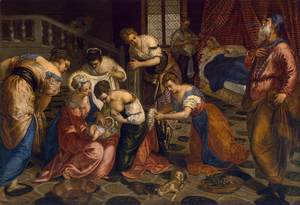
On the Byzantine liturgical calendar, today is the feast of the Conception of Saint John the Baptist. The Eastern Church, at least the Churches with a Greek origin, keeps three conception feasts: Our Lord (March 25), Our Lady (December 9) and the Baptist (September 23). The Latin Church only keeps two.
Calendar study will tell you that only the Savior has a perfect 9-month gestation period; Our Lady is a day under (September 8) and the Baptist, a day under (June 24). The liturgical calendar of the Latin Church places the conception of Mary on December 8, the feast of the Immaculate Conception of the Blessed Virgin Mary.
The theology for today's feast is rooted in the biblical narrative of Zachary and Elizabeth, a couple who had no children and therefore in the eyes of the world plagued by divine disfavor. All of their lives Zachary and Elizabeth begged God to send them a son. Providence heard their prayer and in His plan and mercy for all, ordained that the dawn of salvation would be effected by the birth of John through the agency of the barren Elizabeth. The Church calls John the Prophet and Forerunner of Jesus, the Savior of the world.
Other significant divinely merciful
births to barren women who are a significant part of the Divine Plan of Salvation are Isaac son of Sarah and Samson born to the wife
of Manoah (Samson's mother is not named in Scripture).
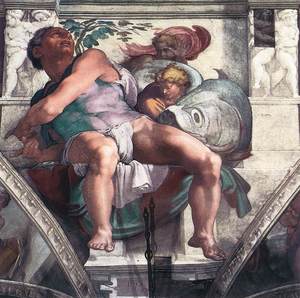 You did pass three days and night within the sea-monster's entrails, showing forth the Lord's descent into the belly of Hades. For when He had freely suffered His saving Passion, He arose out of the sepulcher on the the third day. Hence, we honor you, O Prophet, who wads deemed worthy to be a figure of Christ. (Kontakion, 3rd tone)
You did pass three days and night within the sea-monster's entrails, showing forth the Lord's descent into the belly of Hades. For when He had freely suffered His saving Passion, He arose out of the sepulcher on the the third day. Hence, we honor you, O Prophet, who wads deemed worthy to be a figure of Christ. (Kontakion, 3rd tone)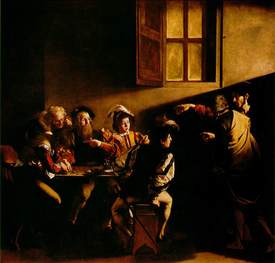
Matthew collected tolls and customs,
Shunned for his work and his dishonesty, Till one day Jesus stood before him, Looked in his face, and told him, "Follow Me!" All that he'd spent his life acquiring, All that he'd scraped and saved and stopred away, Now was no longer worth desiring, Compared with Jesus, Truth and Life and way.
Some of the righteous were offended
That grace should come to such a sinful man. In hopes their hearts might be amended, Jesus explained so they could understand: "Just as the doctor treats the ailing, And passes by the healthy and the whole, So to the stumbling and the failing
I come to offer healing to the soul."
Lord God, who chooses the unworthy,
Who once called out to Matthew, "Follow Me!"
Transform our weakness into glory
And our conceit into humility.
Teach us to know--and to believe it--
That Your unchanging love cannot be earned,
But as Your children we receive it
As did the prodigal when he returned.
Come, all in need of hope or healing,
Come, sick and weak, despondent or ashamed,
Come, bitter, faithless and unfeeling,
Turn your steps home again and be reclaimed!
And you, self-righteous and unbending,
Cast off your pride and your hypocrisy.
Come, leave your life for life unending,
As Matthew did when he heard, "Follow Me!"
(Text by Gail Gillispie)
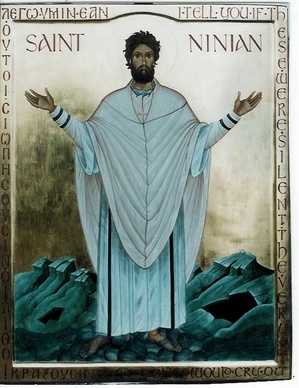
Lord our God, you brought the Picts and Britons to acknowledge of the faith through the teaching of Saint Ninian, the bishop: in your goodness, listen to our prayers: grant that we who have received from him the light of your truth may remain strong in faith and active in works of charity.
"Saint Ninian, whose feast we celebrate today, was himself unafraid to be a lone voice. In the footsteps of the disciples whom our Lord sent forth before him, Ninian was one of the very first Catholic missionaries to bring his fellow Britons the good news of Jesus Christ. His mission church in Galloway became a centre for the first evangelization of this country." (Pope Benedict XVI, September 16, 2010, Glasgow, Scotland)
Let us remember the Holy Father and the people of Scotland today. May the saints of Scotland intercede for them before the Throne of Grace.

Prayer for the Canonization of Blessed Frederic Ozanam
God, our Father, You alone have the power to bestow those precious gifts of yours which we rightly call miracles. If it be Your will, be pleased to grant such a gift on behalf of [mention a person's name here]. We humbly ask that You grant this favor so that Blessed Frederic Ozanam may be canonized by our Holy Mother the Church. We make this prayer through our Lord Jesus Christ, Your Son. Amen.
The name "Frederic Ozanam" may not be well-known to many in the USA, but those who know of or work with the Saint Vincent de Paul Society know well their father in the faith and their founder. Ozanam followed in the foot steps of Saint Vincent de Paul and is a terrific model for all people, particularly the laity because he puts the gospel and the Liturgy into action.
The Saint Vincent de Paul Society has a membership of more than three-quarters of a million people in 47, 000 conferences in 131 countries on 5 continents.
Frederic Ozanam was a married man, a father, well educated, a person who travelled in high society, a man of faith and action. Many people today consider Blessed Frederic to be a precursor to the Second Vatican Council's vision of the laity in the Church.
Ozanam's vision of the Church can be seen in an address he gave on the 4 marks of the Church (one, holy, catholic and apostolic). Here is an excerpt of a talk he gave:
One
One only means of salvation remains to us, that is, that Christians, in the name of love, interpose between the two camps (of rich and poor) passing like beneficent deserters from one to the other ... communicating mutual charity to all, until this charity, paralyzing and stifling the egotism of both parties, and every day lessening their antipathies, shall bid the two camps arise and break down the barriers of prejudice, and cast aside their weapons of anger and march forth to meet each other, not to fight but to mingle together in one embrace, so that they may form but one fold under one pastor.
Holy
Will we be satisfied to lament the barrenness of the present time, when each bears in his heart a germ of holiness, which a simple desire would be sufficient to develop? It we do not know how to love God as the saints did, it is because we see God with the eyes of faith alone, and faith is so weak. But the poor we see with the eyes of flesh. They are present. We can put our fingers and our hands into their wounds, the marks of the crown of thorns are plainly visible on their heads. There is no place for unbelief here ... You poor are the visible image of the God whom we do not see, but whom we love in loving you.
Catholic
A Catholic university (Louvain) should be a cause of rejoicing to the Church, to see raised within her yet another monument to the immortal alliance of Science and Faith.
Apostolic
You have felt the emptiness of material pleasures, you
have felt the hunger for truth crying out within you; you have gone for light
and comfort to the barren philosophy of modern apostles. You have not found
food for your souls there. The religion of your forefathers appears before you
today with full hands; do not turn away, for it is generous. It also, like you,
is young. It does not grow old with the world. Ever renewing itself, it keeps
pace with progress, and it alone leads to perfection.
More about Blessed Frederic Ozanam can be read here, his chronology, and a brief biography.
